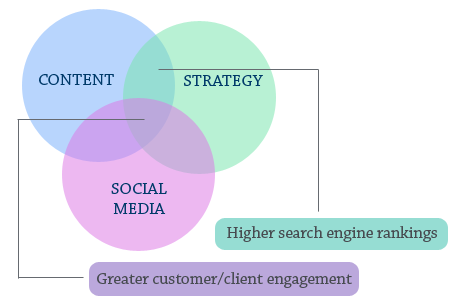These days having targeted content alone doesn’t help you much. You have to approach it from different directions. There was a time when you could attract targeted traffic by simply having good content on your website or blog. Now you need a strategy and while formulating the strategy you have to keep in mind how you want yourself represented on social media and networking websites.
Combine content and strategy and they give you good search engine traffic and add social media and the combination gives you fruitful engagement with your prospective customers and clients. As mentioned in my earlier post the days of one-directional marketing are over. Now you have to engage people in conversations. It is no use having conversations just like any other person because then you become just like any other person. You need to become an authority figure. People should be able to trust you and trust your judgment. You become an authority figure by continuously sharing your knowledge and wisdom with your friends and followers and visitors. You can do this on your blog and through your social media and networking profiles/pages. When you give unconditionally people trust you. This trust is your capital.
So when you are creating your content strategy you also need to simultaneously create your social media strategy because they are interrelated. By the strength of your content you can build your social media presence and through a credible social media presence you can engage your prospective customers and clients and once you are able to engage them positively they do business with you more eagerly and they have no problem recommending your business to their friends, family and colleagues.

Developing a content strategy
In order to develop a content strategy you must realize what you want to achieve through your content. Identify your audience and identify what that audience is actually looking for. You don’t have to provide exactly that but initially you need the traction so be tactful. You have to be attractive enough to your core audience. As a ground work you must
- Identify your core audience
- Develop a dos and don’ts policy for publishing content
- Create a list of your primary, secondary and ancillary keywords
- Decide whether you want longer or shorter articles/blog posts/web pages
- Decide whether you will be generating content in-house or by outsourcing
- Develop metrics to continuously analyze the effectiveness of your content
- Develop long-term evaluation policies
A well-defined content strategy helps you focus better and consolidate your content publishing effort. Since you will be investing money and effort into producing content you have to be particular about exactly what sort of content you want on your website or blog. A list of dos and don’ts helps you keep distractions at bay. Keywords will help you increase your search engine rankings, although you should put more stress on the relevancy of your content rather than the keywords but they definitely help you create more targeted content.
The choice of longer and shorter articles may also affect how well your content performs. You will need to decide whether your audience wants longer web pages or shorter. Here is a nice analysis of the benefits of long and short articles by usability expert Jakob Nielsen. It is an old article but it is still relevant.
Routine analysis keeps you on the right path. Before launching your content strategy you must clearly define where you currently are and where you want to go. Analysis helps you gauge whether you are moving towards your destination or not and you can then make changes accordingly.
Content strategy and social media
People are constantly curating content on social media and networking websites and then talking about that. They find an interesting link, post it on their profile and then their friends and followers comment on it. Their friends and followers may also share the posted content with their own friends and followers and this is how your content may go viral. The more relevant and useful your content is the better exposure it gets on social media and networking websites.
But it is more than that. It is not simply about posting your content. Your content gives you an authoritative presence but you have to strike up conversations with people. Seek feedback and provide answers. Express doubts and show disagreement wherever necessary. The underlying idea is keep the conversation going by seeding new thoughts. This is where your content helps. If you just seed thoughts without backing them with authoritative text people soon begin to lose interest. They need something to read and ponder upon.
Your content begins to make an impact when it encourages people to have conversations. When it stimulates it creates impressions. When they also begin to find your content on search engines the bonding strengthens.
Stay tuned, I will write more on this.

